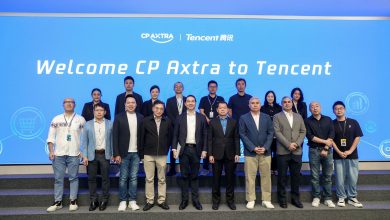96% of Enterprises are Expanding Use of AI Agents, According to Latest Data from Cloudera
Cloudera’s new global survey reveals nearly all enterprises plan to expand AI agent adoption in the next year, but data privacy, integration issues, and governance fears remain top concerns.

Cloudera released the findings of its latest survey report, “The Future of Enterprise AI Agents.” The survey polled nearly 1,500 enterprise IT leaders across 14 countries to understand their adoption patterns, use cases, and sentiments around AI agents. Results show an overwhelming 96% of respondents have plans to expand their use of AI agents in the next 12 months, with half aiming for significant, organization-wide expansion. The applications for this deployment include performance optimization bots (66%), security monitoring agents (63%), and development assistants (62%).
For business and IT leaders alike, agentic AI marks a new frontier—moving beyond traditional automation to systems that can reason, act, and adapt in real-time. When implemented effectively, these intelligent agents unlock operational agility, drive cost savings, and dramatically improve customer engagement. AI agents are quickly becoming a key source of competitive advantage, with 83% of organizations stating that investing in them is crucial to maintaining their edge in the market.
In Singapore, business leaders are signaling a rapid shift toward adopting Agentic AI, fueled by advancements in generative AI. A strong majority (87%) say their previous investments in generative AI have effectively prepared them to implement AI agents—ranking just behind India (95%), Indonesia (91%), and ANZ (89%).
Despite the momentum, concerns about AI bias and fairness remain a major hurdle, with 71% of Singaporean enterprises expressing serious apprehension—significantly higher than in other Asia-Pacific markets such as Japan (46%), Korea (35%), Indonesia (32%), and China (32%). To address this, 45% have implemented safeguards such as human review loops, diverse training data, and formal fairness audits.
In addition to the benefits of the technology, Cloudera’s survey answered some of the biggest questions around agentic AI, including:
- How widely is this being adopted? Adoption is already A majority (57%) of enterprise IT leaders report they’ve implemented AI agents in the past two years—21% in just the last year—signaling rapid momentum that’s only expected to grow.
- How are organizations deploying agents? Two-thirds (66%) are building agents on enterprise AI infrastructure platforms, while 60% are leveraging agentic capabilities embedded in existing core applications. This hybrid approach reflects a clear preference for scalable, secure, and close-to-data
- What’s getting in the way? The top three barriers are data privacy (53%), integration with legacy systems (40%), and high implementation costs (39%). These pain points all stem from a common root: the need for robust, unified data management and
- Where should companies begin? Start with a contained, high-impact project—such as an internal IT support agent. These “fast-to-value” use cases help teams prove ROI, build internal confidence, and lay the foundation for broader, scaled
“AI agents have moved beyond experimentation—they’re now delivering real automation, efficiency, and business results. We’re seeing enterprises run hundreds of models in production, all demanding high-fidelity, well-managed data to drive better outcomes,” said Abhas Ricky, Chief Strategy Officer, Cloudera. “In 2025, agentic AI is taking center stage, building on the momentum of generative AI but with even greater operational impact. Cloudera is enabling this transformation through a robust Enterprise AI Ecosystem, helping global organizations design secure, scalable, and integrated AI workflows that turn data into action.”
Cloudera’s report also addresses what enterprises are actually doing with AI agents. The top use cases vary by industry, shaped by the specific needs and priorities of each sector globally :
- Finance & Insurance: Fraud detection (56%), risk assessment (44%), and investment advisory (38%) are the leading use cases. AI agents are flagging suspicious transactions in real time, simulating market scenarios to evaluate risk, and supporting advisors with personalized investment
- Manufacturing: Top applications include process automation (49%), supply chain optimization (48%), and quality control (47%). Agents are monitoring production lines to catch defects early, rerouting logistics to avoid delays, and streamlining repetitive tasks to improve
- Healthcare: Appointment scheduling (51%), diagnostic assistance (50%), and medical records processing (47%) are the most common use AI agents are reducing admin burden by coordinating schedules, surfacing relevant EMR data, and helping clinicians identify conditions in imaging data.
- Telecommunications: The telecoms industry is seeing substantial innovation fueled by Customer support bots (49%), customer experience agents (44%), and security monitoring agents (49%) are key deployments. Agents are resolving service issues instantly, flagging at-risk customers using behavior data, and protecting networks from emerging threats.
The top use case for AI agents by industry vertical in Singapore are as follows:
- Finance and Insurance: Fraud detection emerged as the leading use case, cited by 60% of However, AI agents are being widely adopted across the sector, with strong usage also reported in risk assessment (50%), claims processing (50%), investment advisory (50%), property valuation (50%), insurance underwriting (50%), and real estate matching (50%).
- Manufacturing: Inventory management was identified as the top use case by 54% of
- Retail and E-Commerce: Customer service (63%) ranked as the most prominent use case, followed by inventory management (58%) and supply chain monitoring (47%).
- Healthcare: Respondents selected the top use case as patient monitoring (71%).
- Telecommunications: The top use cases were evenly split among infrastructure maintenance prediction (40%), performance monitoring (40%), and quality assurance (40%).
To download the full report, click here.




